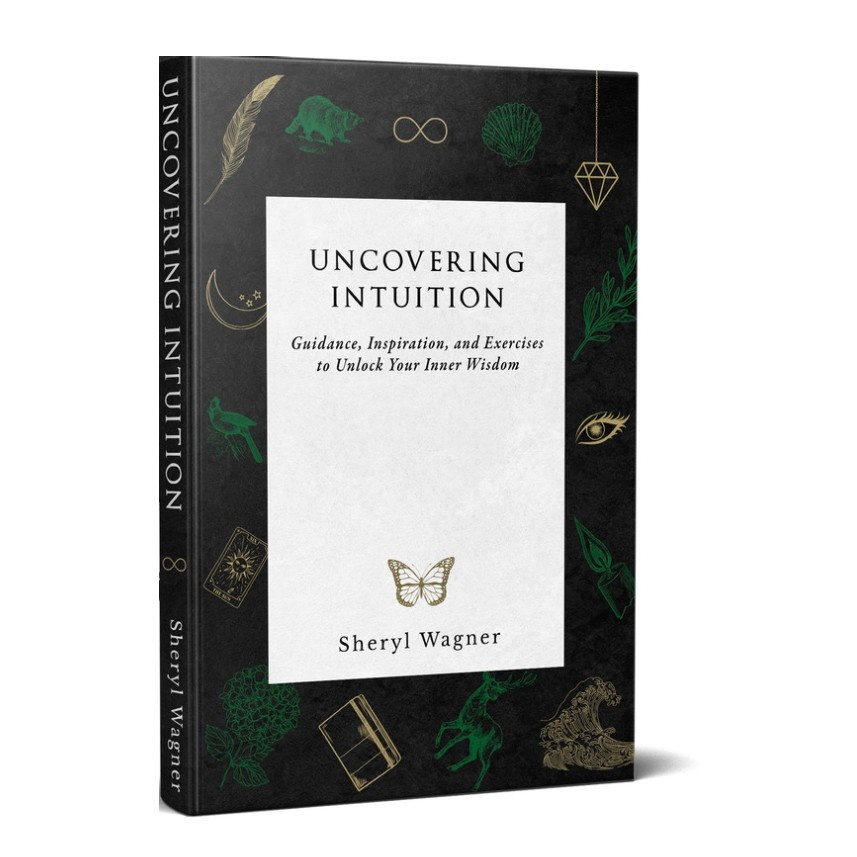How to Listen to Your Intuition (Even When It Feels Confusing)
Jan 20, 2023
Intuition is an instinct; it is a natural ability that we have as humans to know or understand something without conscious reasoning. If you are considering listening to your intuition for the first time, the idea can be frightening. The notion that you know exactly what you want and how to get there is overwhelming. Discomfort, fear, and burnout can be powerful clues that we need to turn inward to discover the truth. We don’t need to wait until a moment of crisis to listen. Intuition is accessible to everyone.
Without a doubt, we all have this ability. Everyone has varying levels of sensitivity and awareness. Intuition is the subtle energetic guidance, that calm inner knowing that leads us. When you are experiencing intuition there is often no need for anxiety because you have “a knowing” of what to do.
Intuition is your soul’s knowing, a subtle energetic guidance that is always available to you. Learning how to connect with and trust your intuition can help you to live a life that is aligned with your soul’s purpose. With time and practice, you can learn to recognize when your intuition is communicating to you.
What does listening to your intuition mean exactly?
Listening to your intuition means moving through the static noise of anxious thoughts, what you think you should do because of societal pressure or other people's opinions. Because intuition is your soul’s knowing, it is ultimately what you truly want and what will serve you best. You might think of this as getting in touch with your higher self or your deepest desires. Listening to your intuition and being able to easily access that guidance can help you live a freer life.
What does intuition feel like?
Intuition operates through the parts of our brain that are responsible for managing creativity, memory, and recognizing patterns. Because our brains are neuronally connected to our digestive system (our gut), many people will experience a “gut feeling” when experiencing intuition. When people say they “have a gut feeling” this is due to the fact that our digestive system has neurons connected to this part of the brain where our intuition lives. Intuition is not always a feeling. When you are experiencing intuition you may not experience “a feeling” at all. Very often intuition can feel almost detached, like a wise part of you is operating on your behalf. Intuition is always experienced in the present moment, whereas anxiety (vs intuition) may seek the future for disaster. Intuition feels calm and grounded and is experienced as “a knowing”.
When you are experiencing intuition it feel subtle, calm, and grounded. This is in contrast to how worry or anxiety feels. Intuition does not engage our nervous system in a fight or flight response the way fear and anxiety does.
How do I know if I’m listening to my intuition?
Since Intuition often presents as “a knowing”, when you’re listening to your intuition you are less likely to question yourself. This can be confusing, especially if you are nervous about making a decision, struggle with anxiety or tend to doubt yourself. With intuition you may not have all the answers, especially the “hows” and “whys” of a situation, you may only know “what” you want. Overthinking can make intuition more difficult, because intuition is your ability to understand something without conscious reasoning. If you tend to analyze or over think situations this can be a challenge since you may not have evidence that your intuitive decision is based on. It may not make logical sense to you.
However, when you make a decision based on intuition you are less likely to question yourself and feel insecure about your choices. Because intuition comes from a place within you that is separate from your ego or what “you feel you should do” you are likely to feel confident when you are making a decision from a place of intuitive knowing. Intuition feels subtle, but sure. Imagine intuition as a gentle nudge. Whereas making a decision based on the opinions of others, or anxieties may feel frantic and pressured causing you to question yourself. Intuitive feelings are subtle rather than fearful and urgent. Worrying thoughts, fears about consequences or judgements, while valid, come from fear not intuition.
How to Recognize & Listen to Your Intuition
1. Get to know what your own energy feels like
Get to know who you truly are beyond any of the roles you identify with. Feel beneath the roles of parent, partner, friend, teacher, etc. into who you truly are for yourself when you’re alone and not needing to present your energy to another person. People often tell me I have a calming presence, which is nice to hear but it is surprising to me because that’s not how I experience my own energy. I experience feeling my energy as busy and excited. If I’m in the presence of someone else, I now know very clearly the difference between my own energy and theirs. This is one of the things I support clients with most when they want to begin developing intuition or understanding energy better. Meditation, breath work and journaling are all helpful tools. But essentially it comes down to spending time with yourself and observing just being you.
If you need help with this, check out: Guided Meditation: Connect to Your Own Energy
2. Understand how your body responds to emotions
Often people will tell me that someone else’s energy is “draining them.” While I have experienced this feeling, I have to acknowledge my part in the process. I don’t believe it’s possible for another person to “take” our energy if we are not giving it. I do however know that the act of engaging with someone can be draining. Aggravation, anxiety, having to assert ourselves repeatedly can all take energy. I find myself trying to energetically resist someone who is pushing my boundaries and this is draining as well. I have to remind myself to stay present and trust myself to hold my boundaries. If our boundaries are firm, essentially we can skip the worry and anxiety that we feel when they are being threatened, because we know we can rely on ourselves.
3. Set boundaries that support you
Boundaries are difficult, but an essential part of caring for yourself. Saying no without apology or explanation is saying yes to yourself, your energy, and anything you hope to create. Set boundaries that allow you to live fully in the present moment and that are aligned with your intuition as much as possible. This can be difficult with the people we love. Remember that you may be able to feel someone else’s emotions AND you are not responsible for fixing them. As someone developing their intuition, setting boundaries is going to become a way that you practice self-love. Like any practice, it can take time to get it right and it will be ongoing. This is difficult in the beginning and not everyone will respect or understand our boundaries. That’s okay. It is not our job to manage other people’s emotional reactions and once you begin to set boundaries and trust your intuition around setting them, you will develop confidence in the process.
4. Take an honest look at how relationships and situations affect you
In my intuitive coaching work, my ultimate goal in intuition development is empowerment. Through providing clear answers and sharing my own experiences, I hope to inspire my clients to feel confident in their own choices and understand that being highly intuitive is not a life sentence to “feel the emotions of others". Oftentimes highly intuitive or empathic people will put the needs of others above their own and in an attempt to feel loved, validated or heal childhood wounds and repair their self-worth they try to heal the uncaring, selfish, or even abusive and narcissistic people in their lives. The more energy they pour into these relationships, the more power and control the uncaring or narcissistic partner, friend or family member acquires. We don’t need to accept that other people are going to leave us feeling drained. If we can learn to become familiar with and stay connected to the essence of our own energy and understand how other people affect us emotionally and energetically, then we can set boundaries that support our well-being and cultivate inner peace.
5. Start to align your life with your intuition
When we talk about alignment in a Spiritual sense, we are talking about being in alignment with our spiritual values and true essence of who we are. Our conscious and unconscious mind, our physical body, our breath, need to be aligned with our truth or we will likely feel a sense of discomfort.
At some point, as adults, most of us develop a set of values, beliefs, and ideas that help us live in alignment. We begin to form ideas of what is wrong and right, and what it looks like to live a good life. For example, most people believe that they need to work hard and make sacrifices in order to be successful. This is a common and well-meaning thought most of us have. Through our conditioning, in our families, and in society most of us have this thought reinforced throughout our lifetime. When we have a recurring thought, at some point it becomes a belief. By the time we reach adulthood most of us are prepared to suffer and work hard for what we want. While we may value feeling rested and spending time with our family and friends, our belief that we have to work hard to be successful will shape the way we behave and the choices we make. We may, for example, choose a higher paying job with better benefits that requires us to work long hours and sacrifice our health believing that we are making the right choice for our family.
My belief is that we can’t and shouldn’t align ourselves with a monetary or even spiritual goal. I believe our purpose is to discover who we are and fully be that person. As much as my life has led me through extraordinary circumstances to become a Psychic Medium, I don’t believe that is my singular purpose in life. I believe that everything we do actually serves the Spirit World and that our purpose is not to be or do one thing, rather that our purpose is to discover who we are and to feel our own aliveness as much as possible in every moment we are here. Sometimes this feels like being bored, angry, sad, joyful, or envious. Our purpose cannot be chased by us or quantified by an amount of happiness we feel or do not feel.
6. Pay attention to how your body feels
The next time you have to make a decision, notice how your body responds. When you are experiencing intuition your body will have unique physical sensations. You might also feel like you have “chills” or a feeling of warmth in your heart center. If something is “a yes” for you, you might notice if it feels as though your body wants to lean towards it. If something is “a no” notice that sensation as well. It can help to remember how you felt during a pleasant time when you knew exactly what you wanted. Perhaps it was excitement or a feeling of calm confidence. In contrast, can you remember a time when you ignored your intuition or went against a gut feeling? There are physical sensations in the body we experience when we go against our intuition. This can leave you feeling tense, like there is a weight on you or even frozen or stuck.
7. Get in touch with your breath
Taking a few deep breaths to quiet your mind before tuning into your intuition can help you feel calmer and quiet nervous thoughts. When we are stressed we tend to breathe more quickly and shallowly which can cause further anxiety and even mimic a panic response in our nervous system. When oxygen is decreased to your bloodstream this can create a nervous system response in your body or cause you to feel you are in fight or flight mode. When you breathe deeply and mindfully this can have an instant effect on our bodies ability to relax and maintain a sense of safety. When you take a deep breath your brain essentially tells your body that it is okay to relax. When making decisions from a relaxed place it’s easier to feel intuition.
8. Ask yourself questions
Developing self awareness and trusting your intuition go hand in hand. With a better understanding and acceptance of yourself, you’re more likely to develop self confidence and trust your decision making abilities. Before making a decision ask yourself: Am I being true to myself? What about this worries me the most? What about this is exciting to me? Is there a way for me to feel more empowered in this situation? Notice the first thing that comes to mind, as it’s more likely to be from your subconscious mind and connected to your intuition.
9. Notice signs and synchronicities
I don’t believe in randomness. Notice synchronicities or meaningful “coincidences” that show up to validate your intuition. You might notice a feeling of deja vu, signs through nature, or numbers and patterns that are meaningful to you. The more you pay attention to signs and synchronicities the more likely you are to notice and receive them. Leave room for the universe to communicate to you and more importantly notice how you feel when you notice one of these signs. You may reflexively have a sensation in your body that validates your intuition. Synchronicities are one way the Universe lets you know that it’s working in cooperation with you, when you stop and notice the signs will appear.
10. Practice using your intuition
Your intuitive sense is like a muscle that can be strengthened with practice and exercise. There are endless possibilities when it comes to practicing with your intuition. I recommend starting with something where you are not attached to the outcome because there is less chance of your conscious mind or emotions taking over. Try quieting the mind and “tuning in” to your intuition to answer simple questions everyday. On your way to the mailbox, be curious about the contents of it. Trust your intuition when finding a parking space or the quickest way home. This might mean discounting logic. If you see an empty parking space on a typically busy street or if taking the scenic way home feels like it will be quicker, try it! You might be surprised by the results.
How to Listen to Your Intuition When Making an Important Decision
It’s natural to struggle with making difficult decisions and sometimes we might get caught up in the idea that we could “choose wrong” and somehow miss our destiny. This is simply not true and you can not miss out on something that is meant for you. Bringing your intuition into the process of decision making can help you make choices that are more aligned with your soul rather than people pleasing or choosing out of fear of failure.
When faced with a decision it’s important to practice self compassion and remember that you can always change your mind. I recommend when faced with two choices simply choosing one at random and noticing how you feel. You might even flip a coin and observe how your body and intuition react to the outcome. This can give you valuable information about what it is you really want. If you are making a choice between two jobs or relationships where there are people involved it can help to practice a visualization. Close your eyes and imagine that the people or person in question is sitting next to you and sharing space and energy with you. Notice how that feels. You’ll likely know right away if that's an experience you’d like to have. By listening to your intuition when making decisions you are more likely to make choices that allow your mind, body, and spirit to be in harmony.
If you'd like to practice your intuition at a deeper level, check out my book Uncovering Intuition! Here's a review a reader so kindly left:
"The best feature of this book is that Sheryl not only speaks of her experiences but offers explanations and guidance. So often books are entirely of the author’s experience and I tend to lose interest. But this was not the case! I finished this in two days, I couldn’t put it down."

Or learn more about intuitive readings or intuitive mentorship, depending on what feels right for you right now.


